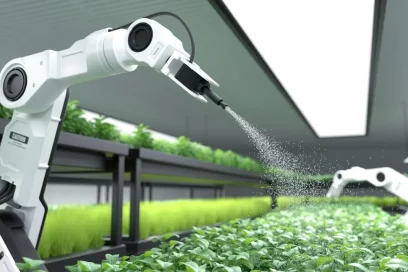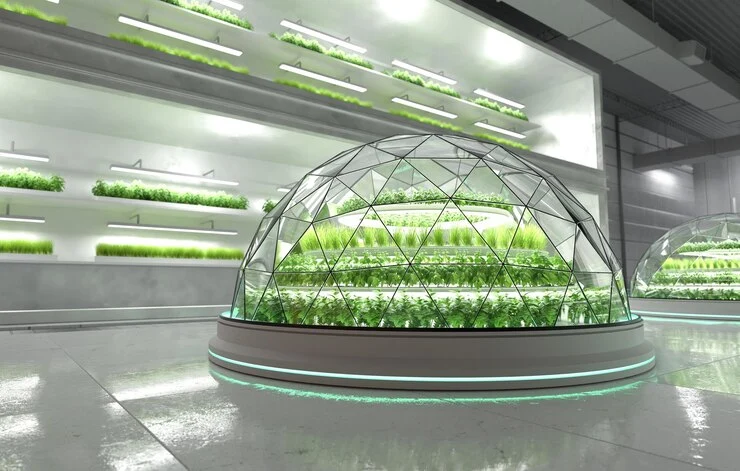As the global population continues to grow and environmental challenges intensify, the agriculture industry is undergoing rapid transformation to meet the rising demand for food, fiber, and fuel. In this blog post, we’ll delve into the future of agriculture, exploring the latest trends and innovations that are reshaping the industry and driving sustainable growth. From new technological advancements to innovative practices, discover how Agrosahas International PVT LTD is leading the way towards a more resilient and productive agricultural future.
Effect of New Technological Innovations in Agriculture and Industry
The integration of new technological innovations in agriculture and industry has revolutionized the way food is produced, processed, and distributed. Some of the key effects include:
- Increased Efficiency: Advanced machinery, robotics, and automation technologies have enhanced productivity and efficiency on farms, reducing labor requirements and optimizing resource use.
- Precision Agriculture: The use of data analytics, sensors, and remote sensing technologies enables farmers to monitor and manage crops with greater precision, resulting in higher yields, improved crop quality, and reduced environmental impact.
- Sustainable Practices: Innovations such as vertical farming, hydroponics, and aquaponics offer sustainable alternatives to traditional agricultural practices, allowing for year-round production in controlled environments with minimal water and land usage.
- Supply Chain Transparency: Blockchain technology is being utilized to provide greater transparency and traceability throughout the agricultural supply chain, ensuring food safety, quality assurance, and fair trade practices.

Newest Innovations in Agriculture
Several groundbreaking innovations are driving the future of agriculture forward, including:
- Gene Editing and Biotechnology: Advances in gene editing techniques such as CRISPR-Cas9 are revolutionizing crop breeding and genetic modification, leading to the development of drought-resistant, disease-tolerant, and high-yielding crop varieties.
- Artificial Intelligence (AI) and Machine Learning: AI-powered technologies are being deployed to analyze vast amounts of agricultural data, providing valuable insights into crop health, soil conditions, weather patterns, and pest management strategies.
- Vertical Farming and Indoor Agriculture: Vertical farming systems utilize stacked layers of crops grown indoors under controlled conditions, maximizing space efficiency and minimizing water usage, pesticide use, and transportation costs.
- AgriTech Startups: The rise of AgriTech startups is fueling innovation across the agricultural value chain, with solutions ranging from farm management software and predictive analytics to drone technology and smart irrigation systems.
How Innovation Helps in Agriculture
Innovation plays a critical role in addressing the complex challenges facing the agriculture industry, including climate change, resource scarcity, food security, and economic inequality. By harnessing the power of technology, data, and collaboration, innovation enables farmers to:
- Improve Productivity and Resilience: Innovative farming practices and technologies empower farmers to boost productivity, optimize resource efficiency, and adapt to changing environmental conditions, enhancing the resilience and sustainability of agricultural systems.
- Enhance Food Quality and Safety: Innovations in food processing, packaging, and distribution improve food quality, freshness, and safety, ensuring that consumers have access to nutritious and wholesome products.
- Foster Economic Development: Agricultural innovation drives economic growth, job creation, and poverty alleviation by unlocking new market opportunities, increasing agricultural productivity, and empowering rural communities with access to resources, knowledge, and markets.
- Promote Environmental Sustainability: Sustainable agricultural innovations minimize the environmental footprint of farming operations, preserving natural resources, protecting biodiversity, and mitigating greenhouse gas emissions, contributing to a healthier planet for future generations.

Biggest Challenge with the Future of Agriculture
While agricultural innovation holds immense promise for the future, it also presents significant challenges and risks that must be addressed, including:
- Technological Divide: Access to innovative agricultural technologies and knowledge remains uneven, with smallholder farmers and rural communities often lacking the resources, infrastructure, and education needed to adopt and benefit from these advancements.
- Ethical and Regulatory Concerns: The ethical implications of gene editing, biotechnology, and other emerging agricultural technologies raise complex questions around intellectual property rights, biodiversity, biosecurity, and equitable access to benefits and risks.
- Environmental Impact: Some agricultural innovations may inadvertently contribute to environmental degradation, soil depletion, water pollution, deforestation, and habitat loss if not carefully managed and regulated.
- Socioeconomic Disparities: The benefits of agricultural innovation are not evenly distributed, leading to disparities in income, wealth, and opportunity between large-scale commercial farmers and smallholder producers, exacerbating social inequalities and rural-urban divides.
Conclusion:
The future of agriculture holds tremendous potential for innovation, transformation, and sustainability, driven by advances in technology, science, and collaboration. By embracing these trends and innovations, Agrosahas International PVT LTD is committed to empowering farmers, improving food security, and building resilient agricultural systems that can thrive in the face of global challenges.




